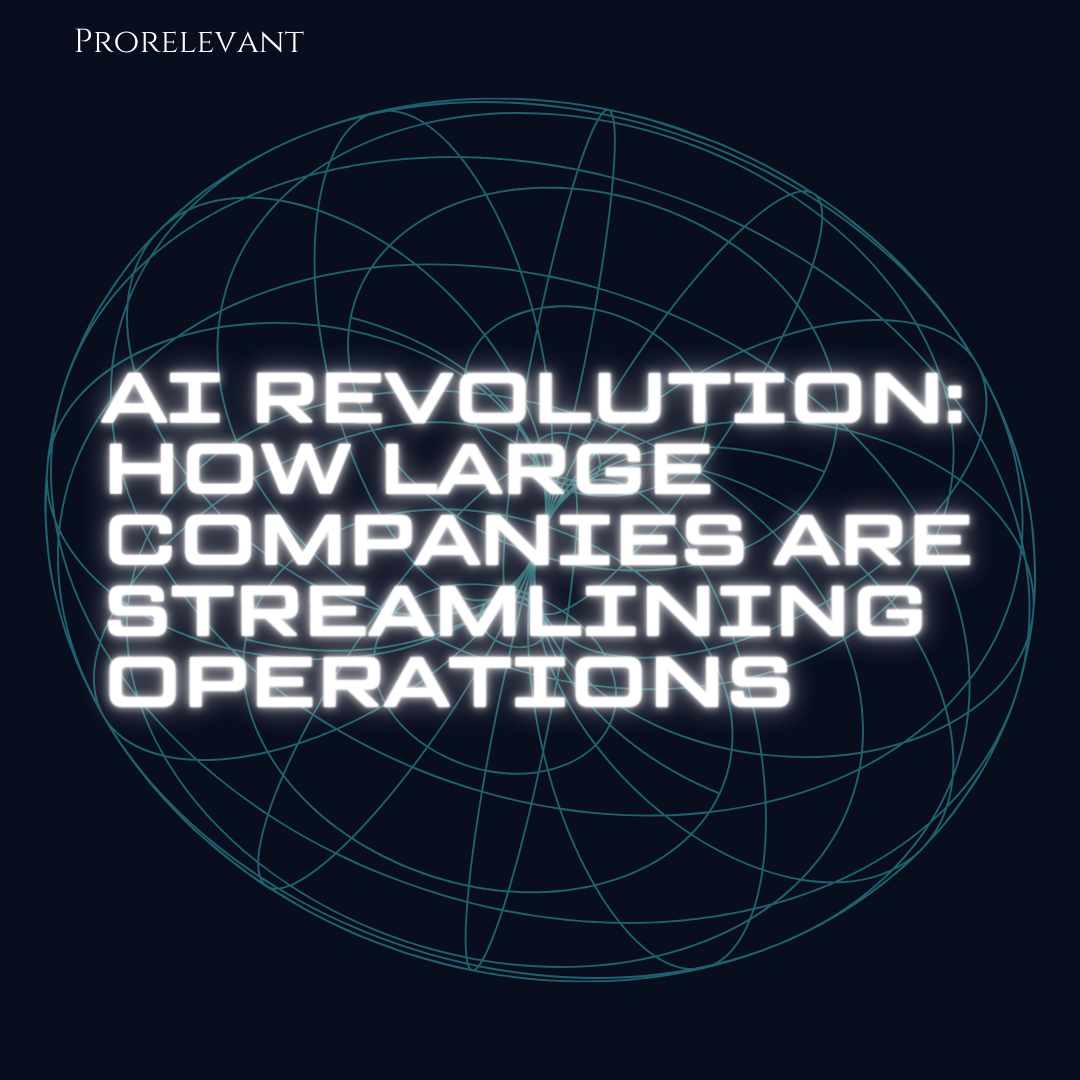
22 Sep AI Revolution: How Large Corporations are Streamlining Operations
Artificial Intelligence (AI) emerged as a powerful tool for large corporations looking to optimize their operations and stay competitive in today’s fast-paced business landscape. These organizations can streamline operations by harnessing AI technologies, from customer service to supply chain management, human resources, and financial processes. In this article, we will explore five key areas where AI is making a significant impact on improving efficiency in large corporations.
- Customer Service Transformation
AI-powered chatbots and virtual assistants are revolutionizing how large corporations interact with customers. These intelligent systems can handle routine inquiries, resolve quickly, and solve complex problems. For example, a significant e-commerce platform employs chatbots to assist customers with order tracking, returns, and product recommendations. These chatbots operate 24/7, ensuring round-the-clock support and reducing the workload on human customer service agents.
- Customer Experience
Furthermore, AI-driven analytics help corporations understand customer preferences and behavior better. Amazon’s recommendation system, powered by AI algorithms, analyzes user browsing and purchase history to suggest relevant products. This personalization enhances the customer experience and drives sales and revenue growth. By leveraging AI to automate tasks and provide tailored experiences, large corporations are setting new standards for customer service efficiency.
- Logistics and Supply Chain Optimization
Managing extensive supply chains can be a logistical nightmare for large corporations, but AI is changing the game. AI algorithms optimize inventory management, demand forecasting, and logistics. A prime example is a global retail giant employing AI to predict consumer demand accurately. The company fine-tunes its inventory levels by analyzing historical sales data, market trends, and external factors like weather conditions, reducing excess stock and minimizing the risk of shortages. This leads to cost savings and increased customer satisfaction.
Additionally, AI-powered automation is transforming logistics and delivery processes. Companies like UPS and DHL are exploring using autonomous vehicles and drones for package delivery. These technologies promise quicker, more cost-effective deliveries, which can significantly streamline supply chain operations. AI’s ability to analyze vast datasets rapidly is proving invaluable in helping large corporations achieve unprecedented levels of efficiency in their supply chain management.
- Human Resources Transformation
Recruiting and managing a large workforce can be a daunting task for corporations. AI is playing a crucial role in optimizing human resource operations. AI-powered tools can sift through many job applications to identify the most suitable candidates, saving HR professionals valuable time. IBM’s Watson, for example, utilizes natural language processing to assess resumes and match candidates with job descriptions accurately.
Once employees are onboarded, AI continues to assist in talent management. Performance analytics tools provide real-time insights into employee productivity, helping HR departments identify high-performing individuals and those needing additional support. AI-driven learning platforms offer personalized training programs to upskill employees, ensuring they remain competitive. Large corporations benefit from enhanced workforce efficiency by streamlining the hiring process and effectively nurturing and retaining top talent.
- Financial Management and Risk Mitigation
AI is also reshaping financial management and risk mitigation in large corporations. AI-driven financial software automates various financial tasks, including invoice processing and budget forecasting. These systems are faster and more accurate, reducing the risk of financial errors. For instance, a multinational bank employs AI algorithms to analyze customer transactions in real-time, detecting potential fraudulent activities to protect the bank and its clients.
Furthermore, AI aids in risk assessment and management. Insurance companies use AI to analyze extensive datasets for accurate risk assessment and pricing. This enables them to offer competitive premiums while minimizing underwriting losses. Large corporations leveraging AI’s analytical capabilities are strengthening their financial stability and resilience in an increasingly volatile business environment.
AI is making inroads in all aspects of the organization. AI-powered efficiency is a game-changer for large corporations, revolutionizing customer service, supply chain management, human resources, and financial processes. As AI technology evolves, its potential to optimize operations and drive cost savings will only increase. Embracing AI-driven solutions is no longer an option but necessary for corporations looking to thrive in the modern business landscape. By harnessing AI’s capabilities, large corporations can streamline operations, deliver enhanced customer value, and remain competitive in an ever-evolving market.
Want to know more?
Want to know more? Visit prorelevant.com to find out how you can customize your marketing efforts.
Check out my previous articles about Demensyfing Analytic AI and The Intersection between Generative and Analytic AI.
References
Hardesty, Larry. “The History of Amazon’s Recommendation Algorithm.” Amazon Science, Amazon Science, 1 Dec. 2022, www.amazon.science/the-history-of-amazons-recommendation-algorithm.
“Research Guides: Artificial Intelligence / Chat-GPT: IBM Watson.” IBM Watson – Artificial Intelligence / Chat-GPT – Research Guides at Golden Gate University, ggu.libguides.com/c.php?g=1163426&p=8493172. Accessed 17 Sept. 2023.




No Comments